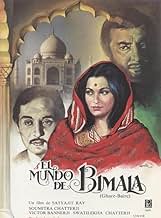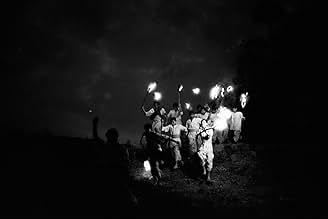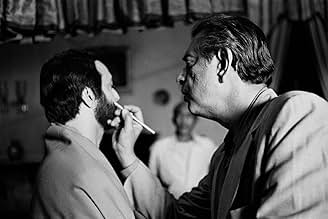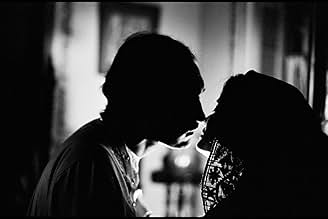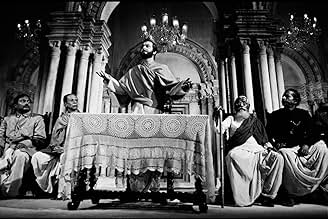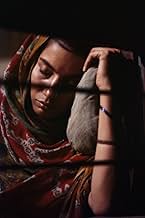IMDb-BEWERTUNG
7,5/10
1996
IHRE BEWERTUNG
Füge eine Handlung in deiner Sprache hinzuA landowner's wife emerges from seclusion through education, defying social norms. Her newfound freedom leads to political awakening when her husband's old friend brings revolutionary ideas ... Alles lesenA landowner's wife emerges from seclusion through education, defying social norms. Her newfound freedom leads to political awakening when her husband's old friend brings revolutionary ideas to their door.A landowner's wife emerges from seclusion through education, defying social norms. Her newfound freedom leads to political awakening when her husband's old friend brings revolutionary ideas to their door.
- Regie
- Drehbuch
- Hauptbesetzung
- Auszeichnungen
- 3 Gewinne & 2 Nominierungen insgesamt
Soumitra Chatterjee
- Sandip Mukherjee
- (as Soumitra Chattopadhyay)
Swatilekha Sengupta
- Bimala Choudhury
- (as Swatilekha Chattopadhyay)
Jennifer Kendal
- Miss Gilby
- (as Jennifer Kapoor)
Bimala Chatterjee
- Kulada
- (as Bimal Chattopadhyay)
Empfohlene Bewertungen
I have literally no words to describe this film! Throughout the film, I felt that I was transported back to the early 20th century and watching the events unfold in front of my eyes.
Bimala, the wife of a Bengali zamindar/gentry is the main protagonist of the film. Her conflicts, her transformations (no spoilers) are the main events occuring in the film. To enjoy the flavour of the film, I would suggest you to watch the film from the POV of her.
The film illustrates the two sides of the Swadeshi movement. One group felt that Swadeshi movement was unrealistic and the poor would be hard hit. Another group, the utopian one, felt that Swadeshi would bring freedom to India.
Bimala, the wife of a Bengali zamindar/gentry is the main protagonist of the film. Her conflicts, her transformations (no spoilers) are the main events occuring in the film. To enjoy the flavour of the film, I would suggest you to watch the film from the POV of her.
The film illustrates the two sides of the Swadeshi movement. One group felt that Swadeshi movement was unrealistic and the poor would be hard hit. Another group, the utopian one, felt that Swadeshi would bring freedom to India.
The Home and The World is an excellent film by the great Bengali director Satyajit Ray. Based on a novel by Tagore, the drama focuses on the personal and political dilemmas faced by a wealthy Bengali woman in 1907 as her husband and his best friend vie for her affection and her political loyalties.
Very few films successfully focus on the ethical complexities of social movement organizing (The Official Story, Matewan, and Mapantsula are rare exceptions; The Way We Were has some brilliant flashes along these lines, but then veers away from these themes all too quickly). We, the viewers, are initially drawn to the viewpoint of the charismatic political organizer, just as the protagonist is drawn to him and out of the restraints of traditional purdah. Far from painting the husband as a vile monster to revolt against, however, the husband encourages the increasing independence of the protagonist, and becomes the loving conscience of the film, even as it exposes the limitations of his apparent passivity.
As the attraction between the protagonist and the organizer mounts, so does the tempo and the tension of the political struggles in the village. As the protagonist learns more and more about the world beyond the secluded part of her palatial home, we, the viewers, begin to understand more and more the complexity of the cross-cutting tensions between: England and India, modernism and tradition, Hindu and Muslim, rich and poor, men and women, leadership and rabble-rousing, means and ends, and love and infatuation.
All this could have been ponderous or didactic, but it's decidedly not, and one of the wonders of the film is that the political issues are woven so deftly into the story of a believable unfolding love triangle. Most movies have a difficult time portraying any motivation for two characters to `fall' in love - this movie manages to portray changes in the relationships between all three main characters with such precision and intensity that I fully believed, and cared deeply, about each one.
The acting is extraordinary, and the cinematography, as is usual in Ray's films, is breathtaking, subtly accentuating the movie's themes of liberation and loss, and the interplay between the two.
Ray said his goal as a director was the same as Renoir's, to show that everyone has their reasons. As perhaps the most warmly compassionate of directors in all of world cinema, he succeeds brilliantly with this film.
Very few films successfully focus on the ethical complexities of social movement organizing (The Official Story, Matewan, and Mapantsula are rare exceptions; The Way We Were has some brilliant flashes along these lines, but then veers away from these themes all too quickly). We, the viewers, are initially drawn to the viewpoint of the charismatic political organizer, just as the protagonist is drawn to him and out of the restraints of traditional purdah. Far from painting the husband as a vile monster to revolt against, however, the husband encourages the increasing independence of the protagonist, and becomes the loving conscience of the film, even as it exposes the limitations of his apparent passivity.
As the attraction between the protagonist and the organizer mounts, so does the tempo and the tension of the political struggles in the village. As the protagonist learns more and more about the world beyond the secluded part of her palatial home, we, the viewers, begin to understand more and more the complexity of the cross-cutting tensions between: England and India, modernism and tradition, Hindu and Muslim, rich and poor, men and women, leadership and rabble-rousing, means and ends, and love and infatuation.
All this could have been ponderous or didactic, but it's decidedly not, and one of the wonders of the film is that the political issues are woven so deftly into the story of a believable unfolding love triangle. Most movies have a difficult time portraying any motivation for two characters to `fall' in love - this movie manages to portray changes in the relationships between all three main characters with such precision and intensity that I fully believed, and cared deeply, about each one.
The acting is extraordinary, and the cinematography, as is usual in Ray's films, is breathtaking, subtly accentuating the movie's themes of liberation and loss, and the interplay between the two.
Ray said his goal as a director was the same as Renoir's, to show that everyone has their reasons. As perhaps the most warmly compassionate of directors in all of world cinema, he succeeds brilliantly with this film.
Here is one more film made our of the work of Tagore. The great Kishore Kumar gave his voice for a song in this film. The worst script adapted by Ray I think. It always bugged me how the entire story was converted to a play and the film was made plainly out of it. The story it interesting though - it shows how the 'boycott British product' movement in early 1900s impacted poor people in our country.
One doesn't expect anything other than excellence from the legendary Ray's work and 'Ghare Baire' (Home and the World) follows the same path. 'Based on the Nobel prize winner, Ranbindronath Tagore's novel, it focuses on the relationship of a woman with her husband and his best friend. Almost 10 years into her marriage, she is happy with her husband but craves for something more. Unlike many women of the time, her husband gives her complete freedom allowing her to live her life the way she wills. He himself is impressed by the British lifestyle and his his wife learn English. He's also very connected to his own Bengali route. Then enters his revolutionary and stubborn friend who is obsessed of having the country get rid of everything English. The husband and his friend have contradictory viewpoints. Yet, he welcomes his friend and never objects to his motivations, as long as he's within his limits. The wife is impressed and intrigued by his friend's political ambitions and is gradually drawn towards him (or he draws her towards him) until they embark in an affair and then the truth becomes more apparent...to everyone, but it's too late.
Ray really takes his time to tell us the story, to let us get to know the characters and clearly display the relationships between them and explain the political situation. He does one hell of a job doing it. He shows the development of the wife's 'relationship' with the friend as her marriage becomes weaker while her husband is hauntingly passive yet trying to understand both his wife and his friend as he is the one who truly loves her and he tries to carry out his social obligations towards his people. We see that the wife learns more about the political dilemmas in the outside world but only from the friend's point of view. Then, as one reviewer, has pointed we are drawn into a web of dilemma's between England and India, modernism and tradition, Hindu and Muslim, rich and poor, men and women, leadership and rabble-rousing, greed and sacrifice, means and ends and love and infatuation.
Master filmmaker that he is, Ray puts it all together in one of the most remarkable way that it does not deviate from the main plot. Ther performances are superb. Victor Bannerjee gives a very intense but subtle performance. In the end, one realizes that it is his character one feels most for. Contrastingly, though Soumitra Chatterjee is more vocal, he makes full use of his nonverbal language, hinting the character's deceitful intentions. Swatilekha Chatterjee plays a very difficult part with tremendous ease. She completely owns the role. Supporting cast are all very good. Ray also makes adequate use of the background score and the cinematography is wonderful. Watch for the camera angles and movement.
Truly a mind-blowing film and I always thought that there aren't enough words that can do justice to describe the excellence of Ray's films. I've only made an attempt and I'm still far behind. Just watch it to see what I mean. Only those who appreciate real cinema will understand.
Ray really takes his time to tell us the story, to let us get to know the characters and clearly display the relationships between them and explain the political situation. He does one hell of a job doing it. He shows the development of the wife's 'relationship' with the friend as her marriage becomes weaker while her husband is hauntingly passive yet trying to understand both his wife and his friend as he is the one who truly loves her and he tries to carry out his social obligations towards his people. We see that the wife learns more about the political dilemmas in the outside world but only from the friend's point of view. Then, as one reviewer, has pointed we are drawn into a web of dilemma's between England and India, modernism and tradition, Hindu and Muslim, rich and poor, men and women, leadership and rabble-rousing, greed and sacrifice, means and ends and love and infatuation.
Master filmmaker that he is, Ray puts it all together in one of the most remarkable way that it does not deviate from the main plot. Ther performances are superb. Victor Bannerjee gives a very intense but subtle performance. In the end, one realizes that it is his character one feels most for. Contrastingly, though Soumitra Chatterjee is more vocal, he makes full use of his nonverbal language, hinting the character's deceitful intentions. Swatilekha Chatterjee plays a very difficult part with tremendous ease. She completely owns the role. Supporting cast are all very good. Ray also makes adequate use of the background score and the cinematography is wonderful. Watch for the camera angles and movement.
Truly a mind-blowing film and I always thought that there aren't enough words that can do justice to describe the excellence of Ray's films. I've only made an attempt and I'm still far behind. Just watch it to see what I mean. Only those who appreciate real cinema will understand.
Read about the great Indian debate between Gandhi and Tagore before watching this movie.
You can see Gandhi in the character of Sandip and Tagore in the character of Nikhil.
Now watch this movie. An absolute masterpiece
Wusstest du schon
- WissenswertesBased on the book "Ghare-Baire" by Rabindranath Tagore. Director Satyajit Ray had previously written a screenplay from this book, but had sold the rights to a group who never filmed the story. 30 years later, Ray rewrote the screenplay for this film.
- VerbindungenReferenced in Z-Channel - Die Geschichte eines Fernsehsenders (2004)
Top-Auswahl
Melde dich zum Bewerten an und greife auf die Watchlist für personalisierte Empfehlungen zu.
- How long is The Home and the World?Powered by Alexa
Details
Box Office
- Weltweiter Bruttoertrag
- 6.951 $
- Laufzeit
- 2 Std. 20 Min.(140 min)
- Sound-Mix
Zu dieser Seite beitragen
Bearbeitung vorschlagen oder fehlenden Inhalt hinzufügen

